新概念英语第二册 第四课
新概念英语第二册 第一课- 第四课
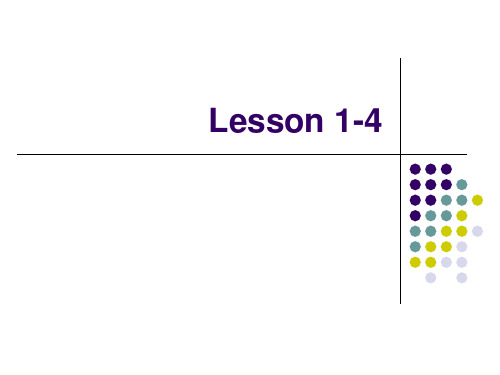
★angry adj. 生气的 ★angrily adv. 生气的 angry =cross I was angry. /He was cross. annoyed: 恼火的; be blue in the face 脸上突然变色 程 I was annoyed. 度 I was angry/cross. 加 I was very angry. 深 I am blue in the face.
11 The writer could not bear it. He could
not __C____ it.
a. carry
b. suffer
c. stand
d. lift
bear 忍受=stand suffer 遭受,忍受 (精神或肉体上)痛苦, suffer后面必须加一种痛苦 I suffer the headache.(肉体上的痛苦) He often suffers defeat.(精神上的痛苦)
Lesson 1-4
Lesson 1 A private conversation
★private adj.私人的 ① adj. 私人的 private life 私生活 private school 私立学校 It's my private letter. It's my private house. ② adj. 普通的 private citizen 普通公民 我是一名公民。
6、In the end, I could not bear it.
in the end :最后,终于,表示一段较长的 时间之后或某种努力之后 她努力独立完成作业。但最后她还是让她 弟弟帮了忙。 She tried hard to finish her homework by herself. In the end, she had to ask her brother for help.
新概念英语第二册课后答案第四课
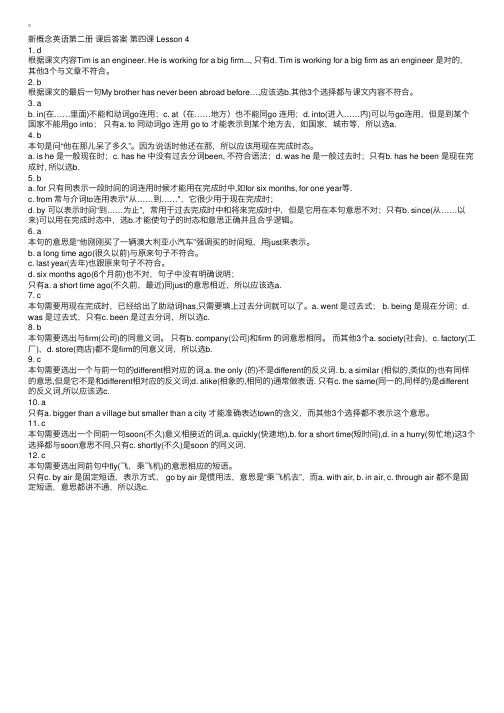
新概念英语第⼆册课后答案第四课 Lesson 41. d根据课⽂内容Tim is an engineer. He is working for a big firm..., 只有d. Tim is working for a big firm as an engineer 是对的,其他3个与⽂章不符合。
2. b根据课⽂的最后⼀句My brother has never been abroad before…,应该选b.其他3个选择都与课⽂内容不符合。
3. ab. in(在……⾥⾯)不能和动词go连⽤;c. at(在……地⽅)也不能同go 连⽤;d. into(进⼊……内)可以与go连⽤,但是到某个国家不能⽤go into;只有a. to 同动词go 连⽤ go to 才能表⽰到某个地⽅去,如国家,城市等,所以选a.4. b本句是问“他在那⼉呆了多久”。
因为说话时他还在那,所以应该⽤现在完成时态。
a. is he 是⼀般现在时;c. has he 中没有过去分词been, 不符合语法;d. was he 是⼀般过去时;只有b. has he been 是现在完成时, 所以选b.5. ba. for 只有同表⽰⼀段时间的词连⽤时候才能⽤在完成时中,如for six months, for one year等.c. from 常与介词to连⽤表⽰"从……到……",它很少⽤于现在完成时;d. by 可以表⽰时间“到……为⽌”,常⽤于过去完成时中和将来完成时中,但是它⽤在本句意思不对;只有b. since(从……以来)可以⽤在完成时态中,选b.才能使句⼦的时态和意思正确并且合乎逻辑。
6. a本句的意思是“他刚刚买了⼀辆澳⼤利亚⼩汽车”强调买的时间短,⽤just来表⽰。
b. a long time ago(很久以前)与原来句⼦不符合。
c. last year(去年)也跟原来句⼦不符合。
d. six months ago(6个⽉前)也不对,句⼦中没有明确说明;只有a. a short time ago(不久前,最近)同just的意思相近,所以应该选a.7. c本句需要⽤现在完成时,已经给出了助动词has,只需要填上过去分词就可以了。
新概念英语第二册第四课教学用资料

has gone to :去了某地没回来 has been to :曾经去过某地,现在不在那个
地方 Have you been to Paris?
from there:从那地方起 from 即可以加时间又可以加地点
from half past 8 to half past 11 from Beijing to Tianjin
成时态的标志
8. 动词+宾语+宾补 Make it simple. find trip exciting find +宾语+形容词做宾补
find the room clean find her happy is finding I'm finding...
现在完成时: have/has + 动词的过去分词
This morning I received a bunch of flowers from a boy, but I didn't accept it.
take take the exam:接收考试; take advice接收建议
receive/have
receive/have a letter from somebody.
• I have just received a letter from my brother, Tim. He is in Australia. He has TbEXeTen there for six months. Tim is an engineer. He is working for a big firm and he has already visited a great number of different places in Australia. He has just bought an Australian car and has gone to Alice springs, a small town in the centre of Australia. He will soon visit Darwin. From there, he will fly to Perth. My brother has never been abroad before, so he is finding this trip very exciting.
新概念二英语第四课课文
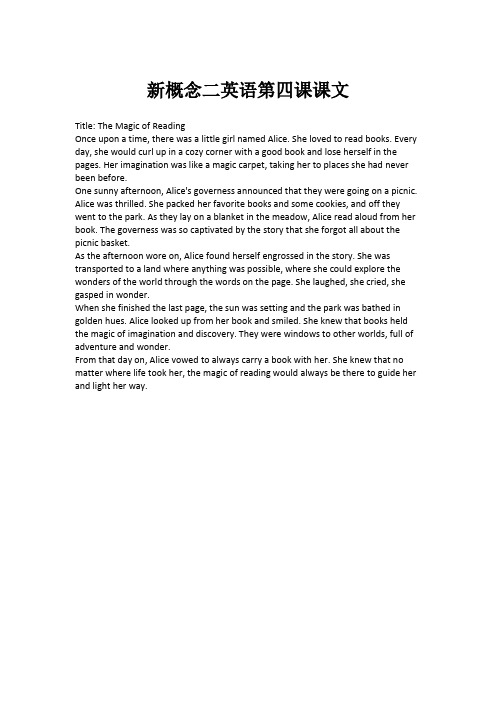
新概念二英语第四课课文Title: The Magic of ReadingOnce upon a time, there was a little girl named Alice. She loved to read books. Every day, she would curl up in a cozy corner with a good book and lose herself in the pages. Her imagination was like a magic carpet, taking her to places she had never been before.One sunny afternoon, Alice's governess announced that they were going on a picnic. Alice was thrilled. She packed her favorite books and some cookies, and off they went to the park. As they lay on a blanket in the meadow, Alice read aloud from her book. The governess was so captivated by the story that she forgot all about the picnic basket.As the afternoon wore on, Alice found herself engrossed in the story. She was transported to a land where anything was possible, where she could explore the wonders of the world through the words on the page. She laughed, she cried, she gasped in wonder.When she finished the last page, the sun was setting and the park was bathed in golden hues. Alice looked up from her book and smiled. She knew that books held the magic of imagination and discovery. They were windows to other worlds, full of adventure and wonder.From that day on, Alice vowed to always carry a book with her. She knew that no matter where life took her, the magic of reading would always be there to guide her and light her way.。
新概念英语第二册第四课最全讲义
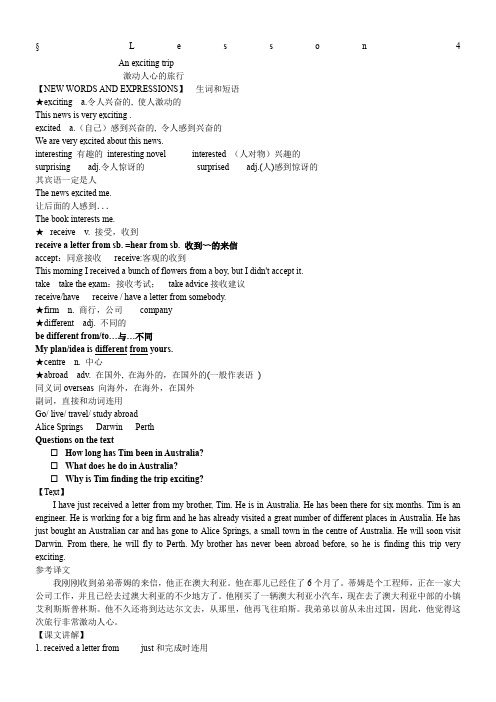
§L e s s o n 4An exciting trip激动人心的旅行【NEW WORDS AND EXPRESSIONS】生词和短语★exciting a.令人兴奋的, 使人激动的This news is very exciting .excited a.(自己)感到兴奋的, 令人感到兴奋的We are very excited about this news.interesting 有趣的interesting novel interested (人对物)兴趣的surprising adj.令人惊讶的surprised adj.(人)感到惊讶的其宾语一定是人The news excited me.让后面的人感到...The book interests me.★receive v. 接受,收到receive a letter from sb. =hear from sb. 收到~~的来信accept:同意接收receive:客观的收到This morning I received a bunch of flowers from a boy, but I didn't accept it.take take the exam:接收考试;take advice接收建议receive/have receive / have a letter from somebody.★firm n. 商行,公司company★different adj. 不同的be different from/to…与…不同My plan/idea is different from yours.★centre n. 中心★abroad adv. 在国外, 在海外的,在国外的(一般作表语)同义词overseas 向海外,在海外,在国外副词,直接和动词连用Go/ live/ travel/ study abroadAlice Springs Darwin PerthQuestions on the text☐How long has Tim been in Australia?☐What does he do in Australia?☐Why is Tim finding the trip exciting?【Text】I have just received a letter from my brother, Tim. He is in Australia. He has been there for six months. Tim is an engineer. He is working for a big firm and he has already visited a great number of different places in Australia. He has just bought an Australian car and has gone to Alice Springs, a small town in the centre of Australia. He will soon visit Darwin. From there, he will fly to Perth. My brother has never been abroad before, so he is finding this trip very exciting.参考译文我刚刚收到弟弟蒂姆的来信,他正在澳大利亚。
新概念英语第二册Lesson4练习题(最新整理)
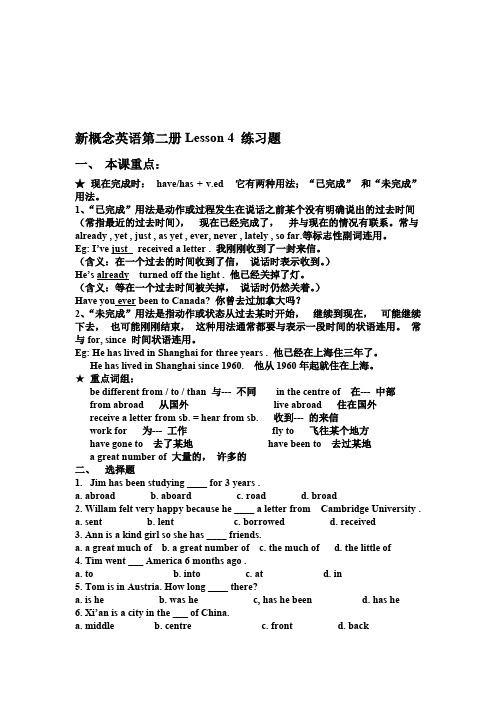
新概念英语第二册Lesson 4 练习题一、本课重点:★现在完成时:have/has + v.ed 它有两种用法;“已完成”和“未完成”用法。
1、“已完成”用法是动作或过程发生在说话之前某个没有明确说出的过去时间(常指最近的过去时间),现在已经完成了,并与现在的情况有联系。
常与already , yet , just , as yet , ever, never , lately , so far.等标志性副词连用。
Eg: I’ve just received a letter . 我刚刚收到了一封来信。
(含义:在一个过去的时间收到了信,说话时表示收到。
)He’s already turned off the light . 他已经关掉了灯。
(含义:等在一个过去时间被关掉,说话时仍然关着。
)Have you ever been to Canada? 你曾去过加拿大吗?2、“未完成”用法是指动作或状态从过去某时开始,继续到现在,可能继续下去,也可能刚刚结束,这种用法通常都要与表示一段时间的状语连用。
常与for, since 时间状语连用。
Eg: He has lived in Shanghai for three years . 他已经在上海住三年了。
He has lived in Shanghai since 1960. 他从1960年起就住在上海。
★重点词组:be different from / to / than 与--- 不同in the centre of 在--- 中部from abroad 从国外live abroad 住在国外receive a letter from sb. = hear from sb. 收到--- 的来信work for 为--- 工作fly to 飞往某个地方have gone to 去了某地have been to 去过某地a great number of 大量的,许多的二、选择题1.Jim has been studying ____ for 3 years .a. abroadb. aboardc. roadd. broad2. Willam felt very happy because he ____ a letter from Cambridge University .a. sentb. lentc. borrowedd. received3. Ann is a kind girl so she has ____ friends.a. a great much ofb. a great number ofc. the much ofd. the little of4. Tim went ___ America 6 months ago .a. tob. intoc. atd. in5. Tom is in Austria. How long ____ there?a. is heb. was he c, has he been d. has he6. Xi’an is a city in the ___ of China.a. middleb. centrec. frontd. back7. I have just _____ an invitation to their wedding this morning .a. takenb. set c, made d. done8. _____ people called to ask about her health.a. A great many ofb. A large numberc. A great manyd. Large number9. How is this book different ____ that ?a. fromb. aboutc. ofd. to10. How long ____ at this job? Since 1990.a. were you employedb. have you been employedc. had you been employedd. will you be employed三、阅读理解Mr. Brown was the manager of an office in London . He lived in the country and went to work by train . He liked walking from the station to his office unless it was raining , because it gave him some exercise. One morning he was walkingalong the street when a stranger stopped him and said to him ,“you may not remember me , sir. Seven years ago I came to London without a penny in my pockets. I stopped you in the street and asked you to lend me some money . You gave me five pounds , because you said that you wanted to take a chance to give aman a start on the road to success . ”Mr. Brown thought for a while and then said , “Yes, I remember you .” “well” said the stranger , “do you stilll want to take a chance?”1.Mr. Brown __________a. lived in the city of Londonb. worked in an officec, walked to London every day d. was a train driver2. Mr. Brown liked walking because _____a. He was a good runnerb. he wanted to be healthyc. he wanted to save moneyd. he wanted to help others3. Mr. Brown walked to his office ______________a. every dayb. when he went to work earlyc. when it wasn’t rainingd. when it was raining4. What do you think of the stranger?a. Perhaps he was a clever but lazy man.b. He knew Mr. Brown very well.c. He was one of Mr. Brown ‘s neighbour.d. Mr. Brown knew him .5. Which of the following sentences is true?a. Mr. Brown was kind- hearted.b. The stranger got another five pounds at lastc. Mr. Brown was not willing to help others.d. Mr. Brown believed the stranger very much.四、翻译1. 史密斯是一名工程师,他在一家大公司工作。
新概念第二册第4课

Lesson 4 An exciting trip一、词汇精选:1.exciting An exciting story an exciting film.excited I feel excited2. receive I receive an letter from my mother 被动收到accept He has just accepted my invitation 主动接受3. work for 为…工作I work for Jim. He works for a big firm.work as 从事…工作he works as an engineer.work in 在…工作My brother works in a factory4. a great number of 大量的(可数) A great number of trees will be planted this year.5. has been in 已经待在某地Joe has been in Guangzhou for three years.has been to 已经去过某地I have been to the Great Wall three times.has gone to 已经到某地去了Jim’s uncle has gone to Austrilia6.in the centre of 在…的中心The park is in the centre of the city.7.fly to 飞往…I am going to fly to Tibet(西藏)soon.8.be abroad 在国外Lily was in abroad last year.study abroad 出国留学I plan to study abroad next month.live abroad 住在国外Do you want to live abroad in the future?9.find + it +形容词觉得…怎么样He finds it interesting.find + them +形容词We find them exciting.find + sth +形容词I find the film boring. They all find your new clothes beautiful.Lily found the trip fantastic.find + doing sth +形容词We all find playing football funny.二、语法1. 现在完成时的时间概念有时是不确定的。
新概念英语第二册第四课答案
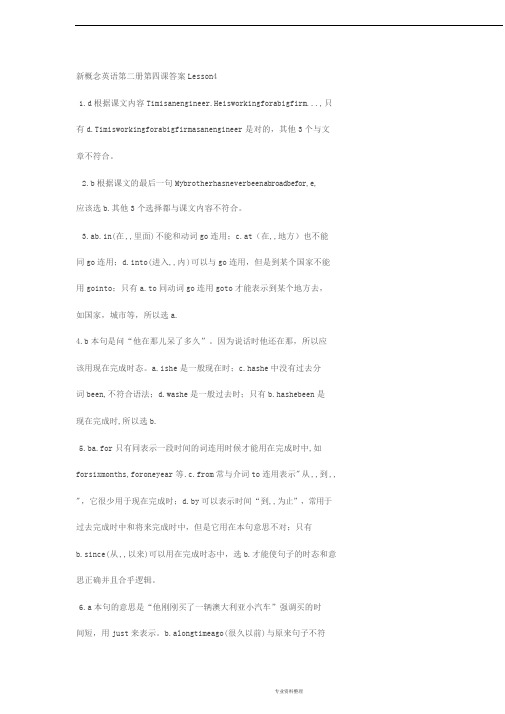
新概念英语第二册第四课答案Lesson41.d根据课文内容Timisanengineer.Heisworkingforabigfirm...,只有d.Timisworkingforabigfirmasanengineer是对的,其他3个与文章不符合。
2.b根据课文的最后一句Mybrotherhasneverbeenabroadbefor,e,应该选b.其他3个选择都与课文内容不符合。
3.ab.in(在,,里面)不能和动词go连用;c.at(在,,地方)也不能同go连用;d.into(进入,,内)可以与go连用,但是到某个国家不能用gointo;只有a.to同动词go连用goto才能表示到某个地方去,如国家,城市等,所以选a.4.b本句是问“他在那儿呆了多久”。
因为说话时他还在那,所以应该用现在完成时态。
a.ishe是一般现在时;c.hashe中没有过去分词been,不符合语法;d.washe是一般过去时;只有b.hashebeen是现在完成时,所以选b.5.ba.for只有同表示一段时间的词连用时候才能用在完成时中,如forsixmonths,foroneyear等.c.from常与介词to连用表示"从,,到,, ",它很少用于现在完成时;d.by可以表示时间“到,,为止”,常用于过去完成时中和将来完成时中,但是它用在本句意思不对;只有b.since(从,,以来)可以用在完成时态中,选b.才能使句子的时态和意思正确并且合乎逻辑。
6.a本句的意思是“他刚刚买了一辆澳大利亚小汽车”强调买的时间短,用just来表示。
b.alongtimeago(很久以前)与原来句子不符合。
styear(去年)也跟原来句子不符合。
d.sixmonthsago(6个月 前)也不对,句子中没有明确说明;只有a .a shor tt im ea (久前,最近)同just 的意思相近,所以应该选a. 7.c 本句需要用现在完成时,已经给出了助动词has,只需要填上过去分词就可以了。
新概念英语第二册第四课完整版教案

Lesson 4 An exciting tripNew Words and Expressions1. exciting: creating or arousing excitement ;令人兴奋的What exciting news this is! 这是多么令人兴奋的消息!That is an exciting game. 那是一场令人兴奋的比赛。
It's such an exciting place. 真是一个令人兴奋的地方。
This is a very exciting book. 这是一本非常扣人心弦的书。
2. receive: 接受;收到receive an invitation[a letter]from sb 接到某人的邀请函[信]receive a sick person into a hospital 把病人收进医院receive guests warmly 热烈欢迎客人Did you receive any letters today? 你今天收到信了吗?The police received several complaints about the noise from the plant. 警察局收到好几宗投诉, 抱怨工厂的噪音太大。
区别用法:receive, accept, take这三个词都有“接受”的意思。
receive只表示被动地接受Then he smiled and told me I would receive an extra £100 a year! 后来他笑了,并且告诉我说,我将一年收到一百英镑的额外收入!If you receive a request like this, you cannot fail to obey it! 如果你收到这样的一种请求,你不会不服从的!A baby can only receive sense impressions, but it can not understand them. 婴儿只能接受感官方面的印象,而不能理解。
新概念英语第二册第四课课文详解
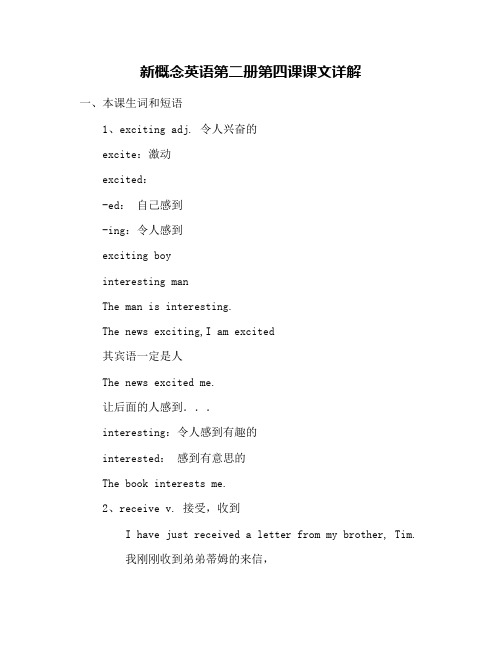
新概念英语第二册第四课课文详解一、本课生词和短语1、exciting adj. 令人兴奋的excite:激动excited:-ed:自己感到-ing:令人感到exciting boyinteresting manThe man is interesting.The news exciting,I am excited其宾语一定是人The news excited me.让后面的人感到...interesting:令人感到有趣的interested:感到有意思的The book interests me.2、receive v. 接受,收到I have just received a letter from my brother, Tim.我刚刚收到弟弟蒂姆的来信,receive[ri5si:v]vt.收到, 接到, 接收(receive的过去式和过去分词是received)re-前缀,表"又,重新"的意思。
Receive/ accept/和take的区别:accept:同意接收receive:客观的收到take take the exam:接收考试; take advice接收建议This morning I received a bunch of flowers from aboy,but I didn't acceptit.take take the exam:接收考试; take advice接收建议receive/havereceive/have a letter from somebody.3、firm n. 商行,公司Companyfirm 主要用在非正式场合和口语,Company 是公司的正式称呼。
4、abroad adv. 在国外副词,直接和动词连用go aroadlive abroadstudy abroad5、so he is finding this trip very exciting.所以,他觉得这次旅行非常激动人心。
新概念英语第二册第四课全课课件

n. 商行,公司
adj. 不同的
centre /'sentə/
abroad /ə'brɔːd/
n. 中心
adv. 在国外
DR
First listen and then answer the question. 听录音,然后回答以下问题。
1. How long has Tim been in Australia? Tim has been in Australia for six months. 2. What does he do in Australia?
常与_______、_____、(only) once、_____或three times等连用,可以 用________________提问,谓语:________v.;
e.g. ① I have already finished my lunch. 我已经吃过午饭了。 ② He has never been late for school. 他上学从未迟到过。
— I have lived here for about ten years. 我在这里住了大约十年了。
DR
21
c. 特别注意:
1. have gone to ( )& have been to( ) e.g. ① It can’t be John. He has gone to town. 那不可能是约翰,他进城了。 ② John knows the way well. He has been to the city before. 约翰很熟悉那里的路。他以前去过那个城市。
3. Why is Tim finding the trip exciting?
DR
新概念英语第二册Lesson4课件
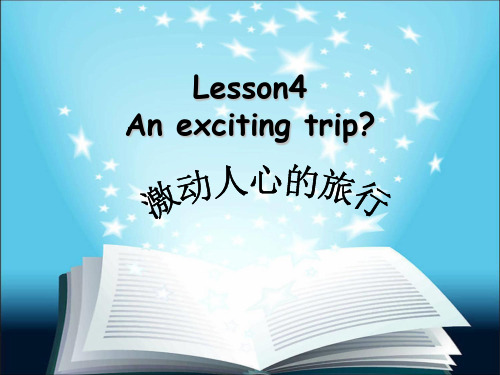
New words
firm n.商行,公司 law firm法律公司
公司
=company
different adj.不同的—— same相同的
adv. differently, n. difference
e.g. My coat is different from yours.
和…相同,一样
be the same with/as
--他们已经离开了,也就是说现在他们人不在这里
I have had my lunch.
--我已经吃过午饭了,也就是说我现在不饿
也可表示持续到现在的动作或状态。
He has learned English since 2001.
现在完成时与一般过去时的比较
1)一般过去时表示过去某时发生的动作或 单纯叙述过去的事情,强调动作;
yesterday.
6. There ___w_a__s(be) a telephone call for you just now. 7. When _d_i_d___ you _c_o__m__e(come) to China?
----Last year.
8. Yesterday I _t_h_o_u__g_h__t (think) that you were not in
现在完成时为过去发生的,强调过去的 事情对现在的影响,强调的是影响。
I saw this film yesterday. (强调看的动作发生过了。) I have seen this film. (强调对现在的影响,电影的内容已经知道 了。)
Grammar
2一般过去时常与具体的表示过去的时间状语连用; 现在完成时通常与模糊时间状语连用或无时间状语。
新概念英语第二册第四课 lesson 4 An exciting trip课件
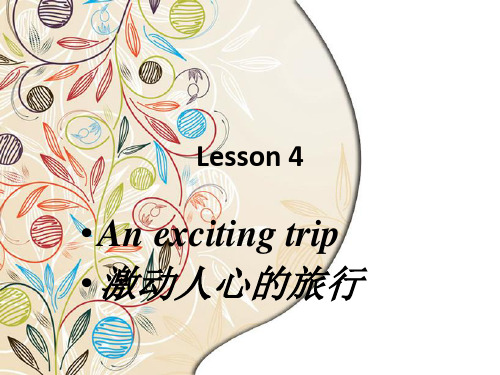
the Capital city : Canberra堪培拉
the famous city : Sydney 悉尼
Kangaroo袋鼠
sheep (one sixth); wool (one third )
Kola Bear :考拉熊
Important words
• exciting • receive • firm • different • centre • abroad
2021/4/7
区别用法:receive, accept, take
• 区别用法:receive, accept, take这三个词都 有“接受”的意思。
• receive(客观情况)只表示被动地接受
• Then he smiled and told me I would receive an extra £100 a year! 后来他笑了,并且告 诉我说,我将一年收到一百英镑的额外收 入!
2021/4/7
Ⅲ Text study
1. Firm公司=company, law firm factory工厂
2. a great number of =a great/g of 修饰不可数名词 a great/good deal of 可数/不可数名词
• Soon got, Soon gone. 来得容易去得快。
5. have been to +sp.去过
have gone to +sp.去了还未回来
• I have never been to Australia. • He has gone to Australia.
2021/4/7
7. 坐飞机 • fly to Australia • go to Australia by
新概念英语2第四课原文
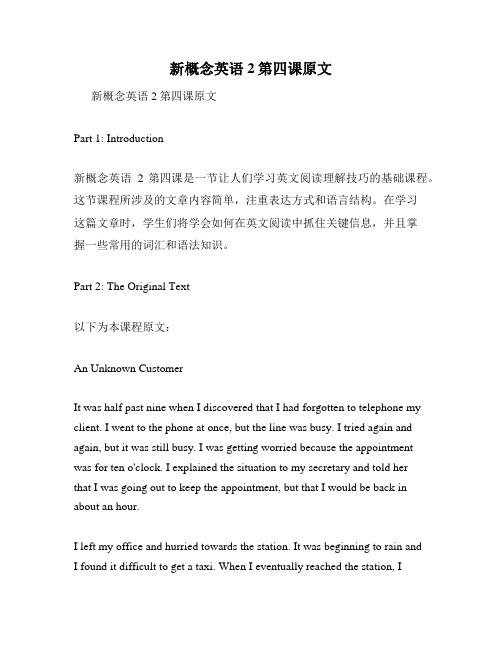
新概念英语2第四课原文新概念英语2第四课原文Part 1: Introduction新概念英语2第四课是一节让人们学习英文阅读理解技巧的基础课程。
这节课程所涉及的文章内容简单,注重表达方式和语言结构。
在学习这篇文章时,学生们将学会如何在英文阅读中抓住关键信息,并且掌握一些常用的词汇和语法知识。
Part 2: The Original Text以下为本课程原文:An Unknown CustomerIt was half past nine when I discovered that I had forgotten to telephone my client. I went to the phone at once, but the line was busy. I tried again and again, but it was still busy. I was getting worried because the appointment was for ten o'clock. I explained the situation to my secretary and told herthat I was going out to keep the appointment, but that I would be back in about an hour.I left my office and hurried towards the station. It was beginning to rain andI found it difficult to get a taxi. When I eventually reached the station, Ifound that the trains were not running because of a strike. I did not know what to do. If I went back to my office, it would take at least half an hour. If I walked to my client's office, I would be wet through when I got there. As there was nothing else to do, I decided to take the subway.When I got out of the subway, I realized that I did not know the way to my client's office. I had only been there once before and that was a year ago. I looked for a taxi, but there was not one in sight. I had no alternative but to walk. I was not at all sure in which direction to go, but I remembered that there was a large church near my client's office. After walking for about twenty minutes, I saw the church in the distance.I was walking quickly, but I suddenly stopped. I had left my umbrella in the subway! I hesitated for a moment and then decided to go back for it. I knew that it would not take long, and I thought that it would be foolish to get wet through if I did not have to. When I got back to the subway, I found that the umbrella had gone. I went to the lost property office and described my umbrella. The man looked in his book and then disappeared into the back of the office. He returned with a large umbrella which he handed to me. It was twice the size of mine.I left the subway again and set off in the direction of the church. I had not gone very far when the rain stopped, and the sun came out. It was a beautiful day. When I arrived at my client's office, I apologized for being late, but he told me not to worry. 'I've only just arrived myself,' he said. 'I was held up by a phone call.'Part 3: Analysis and Discussion这篇原文讲述了一个人迟到的故事。
新概念英语第四课
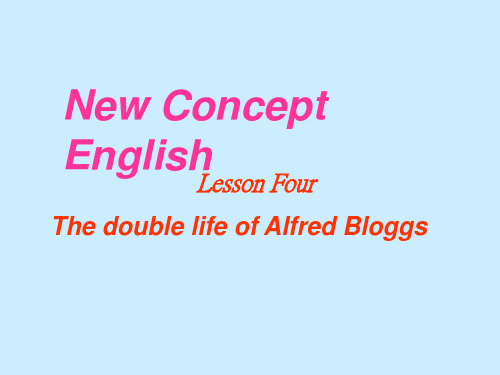
Lesson 4 10 His ______ kept his secret. (1. 12) a.brothers b.workmates c.companions d.comrades
Lesson 4
11 His rise in status more than ______ the loss of money. (11. 14-15)
a.pays back b.rewards c.makes for d.values
Lesson 4
12 He wanted to be ______ ‘Mr. Bloggs’, not‘Alf’. (11. 15-16)
a.addressed as b.named c.cried out d.shouted
Ellesmere Corporation? (He was a dustman.) 7 Was Alf married? (Yes, he was.) 8 What did Alf fail to tell his wife? (That he was a dustman.)
Lesson 4 9 How did he dress every morning? (In a smart black suit.) 10 What did he change into when he got to
New Concept English
Lesson Four
The double life of Alfred Bloggs
Lesson 4 The double life of Alfred Bloggs
Lesson 4
- 1、下载文档前请自行甄别文档内容的完整性,平台不提供额外的编辑、内容补充、找答案等附加服务。
- 2、"仅部分预览"的文档,不可在线预览部分如存在完整性等问题,可反馈申请退款(可完整预览的文档不适用该条件!)。
- 3、如文档侵犯您的权益,请联系客服反馈,我们会尽快为您处理(人工客服工作时间:9:00-18:30)。
bought [bɔ:t] v. 购买,购得( buy的过去式和过去分词 )
够支付; 买通 spent [spent]
v.用钱,花钱( spend的过去式和过去分词 ); 花费; 消耗; 花(时间) museum [mju:ˈziəm] n. 博物馆 public [ˈpʌblik] adj. 公共的
呆在床上不起来___st_a_y_i_n_b_e_d___ 直到___u_n_ti_l _______ 起床早__g_e_t_u_p_e_a_rl_y___ 起床晚___g_et_u_p__la_te____ 向窗外看__lo_o_k_o_u_t_o_f_th_e__window 重复___r_e_p_ea_t______ 外面__o_u_t_si_d_e______ (铃、电话等)响___ri_n_g________
private conversation theatre seat play loudly
私人的 谈话 剧场,戏院 座位 戏 大声地
angry angrily attention bear business rudely
生气的 生气地 注意 容忍 事 无礼地,粗鲁地
A. New words (in Lesson Two)
教书; 训练; 教育
Italian [ɪˈtæljən] n.意大利人; 意大利语; 意大利国民 adj.意大利的; 意大利人的; 意大利语的;
thought [θɔ:t] v.想( think的过去式和过去分词); 思索; 以为; 认为
decision [diˈsiʒən] n.决定; 果断; 决议; (法院的)判决
friendly [ˈfrendli] adj. waiter [ˈweitə] n. lend [lend] v. decision [diˈsiʒən] n. whole [həul] adj. single [ˈsiŋɡl] adj.
adj. 友好的 n. 服务员,招待员 v. 借给 n. 决定 adj. 整个的 adj. 唯一的,单一的
• 6 做一个重大的决定 • make a big decision
• 7 早起
•money on books/ spend
money in buying books
B.The text: An exciting trip
New words and expressions exciting [ɪk'saɪtɪŋ; ek-] adj.令人兴奋的 receive [rɪ'siːv] a letter from…sb. 收到……信 firm [fɜːm] n. 商行,公司 Australia [ɒ'streɪlɪə] n. 澳大利亚,澳洲 Australian [ɑ'strelɪən] adj. 澳大利亚的,澳大利亚人的 Engineer [endʒɪ'nɪə] n. 工程师;工兵;火车司机 bought [bɔːt] v. 买(buy的过去式和过去分词)
until [ʌnˈtɪl]
prep. 直到
outside [aʊtˈsaɪd, ˈaʊtˌsaɪd] adv. 外面
ring [rɪŋ] (rang, rung) v.
v. (铃、电话等)响起
aunt [ɑ:nt] n.
n. 姑,姨,婶,舅母
repeat [riˈpi:t] v.
v. 重复
★翻译下列生词和短语( read and finish the following exercise)
New Concept English 2
Lesson Four
An exciting trip
一、教学目标:
★帮助学生增强语言的运用能力和培养良好的语感
二、教学重点:
★课文的听、读、以及改写 ★关键句的讲解; ★句子结构的分析; ★短语和习惯用法;
A. New words (in Lesson One)
A. New words (in Lesson Three)
send v. [send]
寄,送
postcard n. [ˈpəʊstkɑːd] 明信片
spoil v. [spɔil]
使索然无味,损坏
Italy [ˈɪtəlɪ] n.
意大利(欧洲)
taught [tɔ:t] v.
教( teach的过去式和过去分词
• Important phrases in Text Three
• 1 公共花园
• a public garden
• 2 教我一点英语
• teach me a little English
• 3 借给我一本书
• lend me a book
• 4 考虑,想起
• think about
• 5 给我的朋友寄贺卡 • send cards to my friends
different ['dɪf(ə)r(ə)nt] adj. 不同的 centre ['sentə] n. 中心 already [ɔːl'redɪ] adv. 已经,早已;先前 abroad [ə'brɔːd] adv. 在国外 a great number of 许多 Alice Springs 艾利斯·斯普林斯 Darwin ['dɑ:win] 达尔文 Perth [pə:θ] 伯斯
1. Listen and complete the following text.
I have just 1_r_e_c_e_iv_e_d_ a letter from my brother, Tim. He is in 2_A_u_s_t_r_a_li_a . He has been there for six months. Tim is an engineer. He is working 3__fo_r__a big firm and he has already visited a great 4_n_u_m__b_e_r___ of different places in Australia. He has just 5__b_o_u_g_h_t_ an Australian car and has gone to Alice springs, a small town in the 6_c_e_n_t_r_e_ of Australia. He will soon visit Darwin. From there, he will 7__f_ly__ to Perth. My brother has never been 8_a_b_r_o_a_d before, so he is finding this trip very 9_e_x_c_i_ti_n_g_ .
